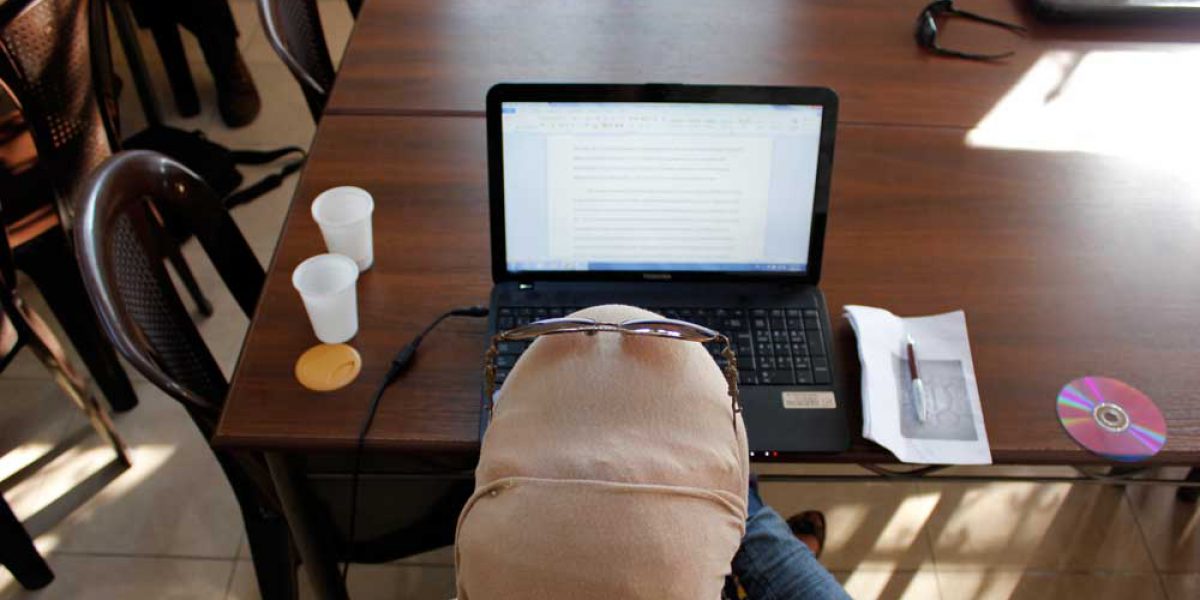Jordan: Education Enables Sharing Among Different Refugee Communities
30 October 2014

The city where I used to live is located in the middle of Syria. My neighborhood was very close to an area that was loyal to the Syrian government, and in the long run that meant trouble for us. It was the summer of 2011, my schoolmates and I were ordinary students who were studying for exams and just looking forward to enjoying our summer vacation. It was about to be my last Syrian summer.
Instead of spending days hanging out with my friends, the Syrian crisis overwhelmed us. We heard news about events elsewhere, but we didn’t do anything at first. Then, people in our area decided to hold a sit-in in the main square of the city to protest peacefully the deaths of seven people. The sit-in started in the afternoon and the organizers wanted to make it last for three days. Hundreds of people came from many different areas of the city.
I still remember how quiet the city was that day, until after midnight when the shooting started. People ran around, calling for help. Women and children cried, as gunshots were fired everywhere. The next day, a group of gunmen came to our neighborhood and arrested most of the young men who had participated in the sit-in.
The situation deteriorated, and soon we understood what it meant to be bombed. As a student, all I was worried about was the destruction of my school. I didn’t know nor understand why they wanted to harm our future leaders and achievers. After more than twelve months of the crisis, a group of government-supporters came to our neighborhood and announced on a loudspeaker, “every single family has to leave the area, unless you want to be killed. We’re coming tomorrow, and we hope to find nobody here.”
As far as I know, only three people refused to leave; I never heard anything from or about them again. My family and I left the neighborhood and, for a while, we lived in another part of the city. Eventually, we fled to Jordan, because the situation had become too dangerous. Looking out the window on the way to Jordan, I felt happy to be moving, glad I’d meet new people.
First, we needed to rebuild our lives in Jordan. I asked workmates about Jordanian cultural and other practices. In general, as a family, we are a flexible group of people, so I knew we would cope with living in a new and different society. With such a huge influx of Syrians, the attitudes of Jordanians towards newcomers changed. They believed the newcomers were taking their job opportunities and driving up the cost of living. I think that’s why Jordanians started treating us like strangers.
The reality of life in Jordan is not at all like I imagined it would be. Life here is so different to Syria, and everything is so expensive. First, I needed to work as nobody would help us financially. I shelved the idea of going back to school and started working. After a while, I realized I wasn’t on the right track. If I accepted my status as an outsider, without access to any kind of further education, I would destroy any chance I had of a decent future.
By chance, my mum found a learning program at which she could volunteer as a teacher, and she also told me about the online higher education courses organized by Jesuit Refugee Service, the Jesuit Commons: Higher Education at the Margins (JC:HEM) program. At first I was worried I wouldn’t be able to return to class because of my work schedule, but fortunately JC:HEM is designed for people who have to work to get by.
My first day at the JRS learning center was so exciting. I met many people from different countries. I felt very close to them, even more so than those who were part of my daily life. Perhaps, it’s because living through a crisis brings people closer. We have so much in common. We have almost the same stories. We face the same challenges and suffer from the same problems. We’re not entitled to work legally. It’s difficult for refugees to get work permits in Jordan. We all struggle to continue our studies. We feel like outsiders, confined by all these rules.
Everyone should work hard to get what s/he wants. And it’s reassuring that there are so many people who want to help refugees. But most of the work should be done by refugees themselves, so that they and their communities can stand on their own two feet.
After completing two certificate courses, I’m proud to say that I enrolled in the three-year online diploma program. I’m also proud to say that my English has improved, and now I can communicate with many people from all over the world. Learning another language has made me a better communicator and more open-minded. I hope that one day I will be able to leave Jordan and study further in a university in the USA or Europe.
*This name has been changed to protect the author’s identity



